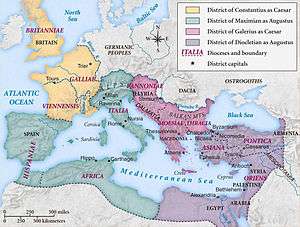293
This article is about the year 293. For the pain medication, see Co-codaprin.
| Millennium: | 1st millennium |
|---|---|
| Centuries: | 2nd century · 3rd century · 4th century |
| Decades: | 260s · 270s · 280s · 290s · 300s · 310s · 320s |
| Years: | 290 · 291 · 292 · 293 · 294 · 295 · 296 |
| 293 by topic | |
| Politics | |
| State leaders – Sovereign states | |
| Birth and death categories | |
| Births – Deaths | |
| Establishment and disestablishment categories | |
| Establishments – Disestablishments | |
| Gregorian calendar | 293 CCXCIII |
| Ab urbe condita | 1046 |
| Assyrian calendar | 5043 |
| Bengali calendar | −300 |
| Berber calendar | 1243 |
| Buddhist calendar | 837 |
| Burmese calendar | −345 |
| Byzantine calendar | 5801–5802 |
| Chinese calendar | 壬子年 (Water Rat) 2989 or 2929 — to — 癸丑年 (Water Ox) 2990 or 2930 |
| Coptic calendar | 9–10 |
| Discordian calendar | 1459 |
| Ethiopian calendar | 285–286 |
| Hebrew calendar | 4053–4054 |
| Hindu calendars | |
| - Vikram Samvat | 349–350 |
| - Shaka Samvat | 214–215 |
| - Kali Yuga | 3393–3394 |
| Holocene calendar | 10293 |
| Iranian calendar | 329 BP – 328 BP |
| Islamic calendar | 339 BH – 338 BH |
| Javanese calendar | 173–174 |
| Julian calendar | 293 CCXCIII |
| Korean calendar | 2626 |
| Minguo calendar | 1619 before ROC 民前1619年 |
| Nanakshahi calendar | −1175 |
| Seleucid era | 604/605 AG |
| Thai solar calendar | 835–836 |
| Wikimedia Commons has media related to 293. |

Map of the Roman Empire under the Tetrarchy (293)
Year 293 (CCXCIII) was a common year starting on Sunday (link will display the full calendar) of the Julian calendar. At the time, it was known as the Year of the Consulship of Valerius and Valerius (or, less frequently, year 1046 Ab urbe condita). The denomination 293 for this year has been used since the early medieval period, when the Anno Domini calendar era became the prevalent method in Europe for naming years.
Events
By place
Roman Empire
- March 1 – Emperor Diocletian and Maximian appoint Constantius Chlorus and Galerius as Caesars. This is considered the beginning of the Tetrarchy, known as the Quattuor Principes Mundi ("Four Rulers of the World").
- The four Tetrarchs establish their capitals close to the Roman frontier:
- Nicomedia (northwestern Asia Minor) becomes the capital of Diocletian
- Mediolanum (Milan, near the Alps) becomes the capital of Maximian
- Augusta Treverorum (Trier, in Germany) becomes the capital of Constantius Chlorus
- Sirmium (Serbia, on the Danube border) becomes the capital of Galerius
- Diocletian's Palace is built at a small bay on the Dalmatian coast, four miles from Salona, today's Split, Croatia.
- Constantius Chlorus retakes some of the Gallic territories and conquers the crucial port of Bononia (modern Boulogne).
- Carausius, Roman usurper, is murdered by his finance minister Allectus, who proclaims himself "emperor" of Britain.
- Constantius Chlorus defeats the Franks on the Rhine frontier in Batavia (Netherlands).
Asia
- King Tiridates III of Armenia, (with Rome as suzerainty), invades Assyria.
- King Bahram II of the Persian Empire dies after a 17-year reign; his son Bahram III ascends to the throne. After four months he is murdered by viceroy Narseh with support of the nobility.
- Narseh becomes king of Persia and engages Rome in eight years of constant warfare.
- Tuoba Fu succeeds his uncle Tuoba Chuo as chieftain of the Chinese Tuoba clan.
By topic
Religion
- Probus succeeds Rufinus as Patriarch of Constantinople.
Births
Deaths
- Bahram II, king of Persia
- Bahram III, king of Persia
- Carausius, Roman usurper of northern Gaul and Britain
- Tuoba Chuo, chieftain of the Chinese Tuoba tribe
References
- ↑ Spencer C. Tucker (2009-12-23). A Global Chronology of Conflict: From the Ancient World to the Modern Middle East: From the Ancient World to the Modern Middle East. ABC-CLIO. p. 153. ISBN 978-1-85109-672-5.
This article is issued from Wikipedia - version of the 9/23/2016. The text is available under the Creative Commons Attribution/Share Alike but additional terms may apply for the media files.
